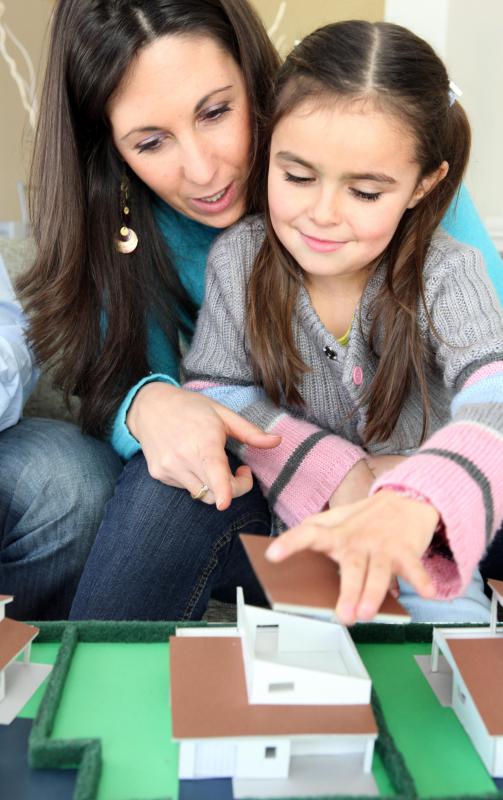At WiseGEEK, we're committed to delivering accurate, trustworthy information. Our expert-authored content is rigorously fact-checked and sourced from credible authorities. Discover how we uphold the highest standards in providing you with reliable knowledge.
What Are the Different Types of Therapy for Children?
In considering the various types of therapy for children, it is helpful to first discuss the reasons a child might need therapy. Primarily, children need therapeutic services to address challenges associated with development or cognitive skills, emotional or behavioral difficulties, or rehabilitation after an injury or surgery. Each category of therapy involves numerous specialties, approaches, and modalities. Often medical professionals call for more than one type of therapy for children faced with developmental delays, mental health disorders, or physical handicaps.
For example, a child with a developmental delay disorder can benefit from occupational therapy, behavior modification therapy, and speech therapy. Occupational therapies provide both fine and gross motor skills training to help children improve balance, hand-eye coordination, and tactile awareness. Behavior modification therapy assists with lessening inappropriate responses to outside stimulation, such as screaming or hitting when the child becomes anxious. Speech and similar therapies help improve communication skills.

Listing all of the specific types of children's therapy is nearly impossible, especially given the frequency with which new methods appear and old methods prove less effective. Not all therapeutic methods or therapy approaches are recognized by official medical organizations or meet with the approval of all cultures. As such, it can be more beneficial and informative to discuss the goals of specific therapeutic specialties when discussing therapy for children.

Cognitive skills therapies tend to focus on critical thinking, problem solving, and other mental acuity training needed to learn and develop. Such therapies include speech therapy, specialized academic environments, and memory training, to name a few. A child with a learning disability, for example, would engage in various cognitive therapies to develop the ability to work around any deficits or retrain the brain to learn in new ways.

Emotional and behavioral therapy for children typically focuses on addressing mental health issues, problematic behaviors, or poor emotional responses. Children in the midst of divorce proceedings, who have lost a parent or other loved one, or suffered a traumatic event tend to benefit from a variety of behavioral therapy approaches. The goal is typically to teach the child appropriate responses to stressors, ways to cope with strong emotions, and effective decision-making skills.

After an accident, injury, or surgery, many children need rehabilitative therapies. These therapies focus on helping the child return to normal activity levels and physical strength. Depending on the type of physical challenge, this particular type of therapy for children may also focus on teaching the child to adapt to a new physical state. Regaining mobility, restoring function, or otherwise focusing on the child's physical capabilities can often take months or years, depending on the extent of the physical challenge. Additional therapies, such as emotional/behavioral therapy, often complement rehabilitative therapy.
AS FEATURED ON:
AS FEATURED ON:















Discussion Comments
@pleonasm - I don't know about that. I've only ever had counseling style therapy, but as a kid I loved having the one on one attention from an adult, whether or not it was actually doing me any good from an educational standpoint.
Every child is different, so they will react differently to perceived stigmas and things like that, but it won't always be a negative reaction.
@KoiwiGal - As long as parents don't just jump to conclusions about their children without professional advice. When I was a kid my teacher told my parents that I needed speech therapy immediately because she couldn't understand what I was talking about half the time. It turned out that she simply couldn't understand my accent (we moved around a lot when I was little) and assumed I had some kind of speech impairment.
Luckily my parents realized what was going on and were able to work with the teacher to understand me better. But it would have been very frustrating to have to take therapy sessions when I didn't need them, and it would have probably taken time away from class as well, which would have done more harm than good.
If you suspect your child might need speech therapy or something similar, make sure they get it as soon as possible. Often a school will be able to provide some or most of this and you can work together with the therapist to help your child after school as well.
Any kind of developmental delay can hurt your child's education in the long run, because once they get behind in one area, it will effect everything else. And speech is definitely an important skill. I've taught children who had trouble articulating themselves and it didn't matter how good they were at other subjects like math, they weren't able to keep up with their peers because they didn't know how to communicate the answers.
Post your comments